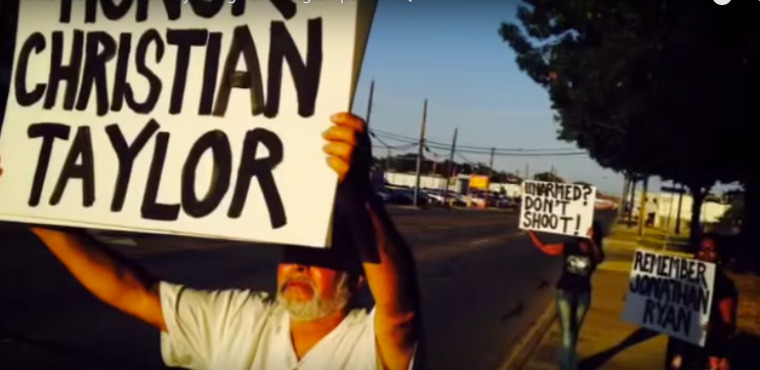FBI refuses probe in case of black football player obsessed with God who was shot by police

ARLINGTON, Texas (Christian Examiner) -- Police pushed back recently against rumors amid a growing national firestorm surrounding the Aug. 7 shooting of college football player Christian Taylor inside a car dealership showroom.
Taylor's life had taken a dramatic turn in the weeks prior to his death, loved ones told the Washington Post. He'd had a religious awakening and had talked obsessively about God and his desire to be a leader for social justice.
In a YouTube posting, the department directly confronted rumors they said "grossly misrepresents the facts and makes a false claim that Mr. Christian Taylor was shot by police in less than one second after APD officers made contact with him."
Brad Miller, a 49-year-old rookie cop in Arlington, Texas, was fired this week for demonstrating "inappropriate judgment" when he shot and killed unarmed 19-year-old Christian Taylor during a suspected burglary.
What led Miller to open fire is still the subject of a criminal investigation, and there's another major question in the case: Why was Taylor even at the car dealership?
Family and friends say the bizarre behavior captured on surveillance video — including breaking into a car and driving into the showroom window — was completely out of character for the football player and honor student at Angelo State University.
Adrian Taylor, the teen's father, said the person in the video "was not my son."
Of the more than 600 cases of people shot and killed by police this year, Taylor's death is one of only a handful in which the officer involved has been fired or charged with a crime.
In a news conference late Tuesday, Arlington Police Chief Will Johnson said Miller, 49, a trainee with no previous police experience, violated department protocol by pursuing Taylor alone into the dealership showroom without backup and without a plan for a peaceful arrest.
Miller's actions created "an environment of cascading consequences that produced an unrecoverable outcome," Johnson said, adding that he had "serious concerns as to the rationale articulated for the use of deadly force."
Regardless of what brought Taylor to the car dealership, Arlington police say Miller made several mistakes in responding to the situation. "Officer Miller reported that he was in fear and that he believed he was alone inside the building and that he would be overpowered by Mr. Taylor," said Police Chief Will Johnson.
"Officer Miller believed that he was alone. This fear and feeling of isolation was the result of his poor decision to enter the building without assistance and without an arrest plan."
Several experts told the New York Times that across the nation police are advised to wait for backup, establish a perimeter, and have a plan — particularly in a situation where they're trying to make an arrest, not save lives.
But Johnson also portrayed Taylor as a suspect bent on physical confrontation.
Taylor was killed on the eve of the first anniversary of the shooting of Michael Brown, and he'd posted about the Black Lives Matter movement on Twitter. However, his friends said he had not talked about the recent unrest in Ferguson.
The Post wondered if Taylor had tried provoking a confrontation with police, something which people who commented online found objectionable, but something about which his best friend, Jordan Smith, also said he'd considered.
"Now that I sit back and think about it, maybe. But, no," Smith told the Post.
"That's not me saying he did this on purpose, because I know he wouldn't," Smith said. "We had too much fun. He lived his life too good to go give it away."
Others speculated that a break or drugs could explain Taylor's behavior. Taylor's father said he had no history of mental illness, and his friends said he didn't use drugs.
The Star-Telegram reported that Taylor had no criminal convictions, but in December he reportedly was sentenced to six months' deferred-adjudication probation for possession of a controlled substance.
Taylor was charged during a 2013 traffic stop when police found 11 hydrocodone tablets for which he didn't have a prescription. The case was dismissed after he completed probation last month.
Chief Johnson described Mr. Taylor's death as a "tragedy" and vowed days ago that "there will be consequences" if the shooting turned out to be unjustified.
He had asked the Federal Bureau of Investigation to participate in and review its investigation, based on the department's "commitment to transparency," Johnson said.
But in a statement released Monday, a spokeswoman for the F.B.I. office in Dallas said the bureau declined the request, saying it had "full confidence in the ability of the Arlington Police Department and Tarrant County district attorney's office to conduct a thorough investigation of this matter."
The spokeswoman, Allison Mahan, said that if information came to light indicating a potential federal civil rights violation, "the F.B.I. is prepared to investigate."
The F.B.I. did not respond to a request for comment on Tuesday.
Meanwhile, at a memorial service for Taylor, Ronnie Goines, senior pastor at Koinonia Christian Church, told of the college student's passion for "helping young people meet Jesus," according to an AP story.
At the service, Goines asked for prayer for the family members, but also for police officers and firefighters "willing to lay down their lives" for others.
Adrian Taylor, speaking during a vigil later that night, urged people not to make his younger brother's death a racial issue.
"Please don't make this a racial matter," Taylor said, according to the Dallas News. "This can happen to everyone, to everyone--white, black, orange, purple and green."